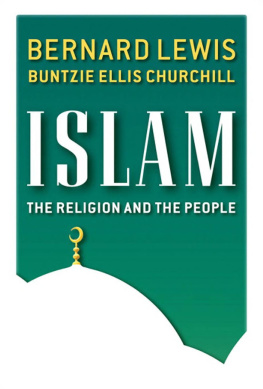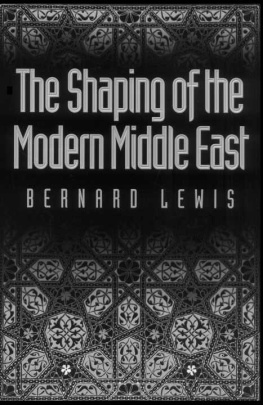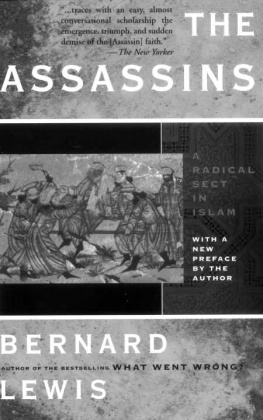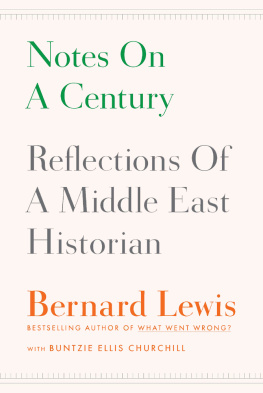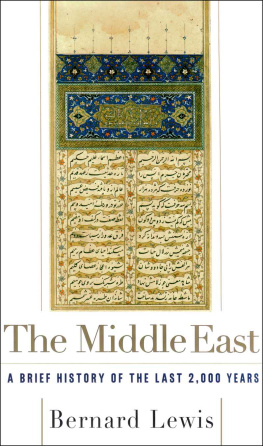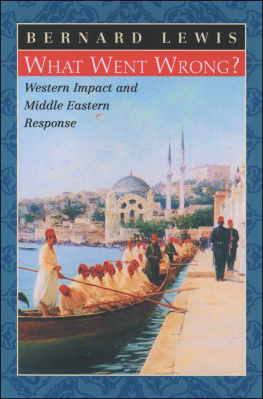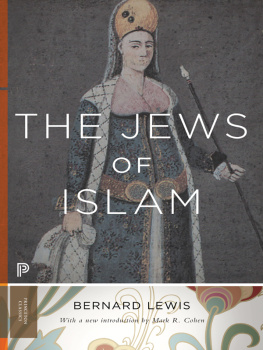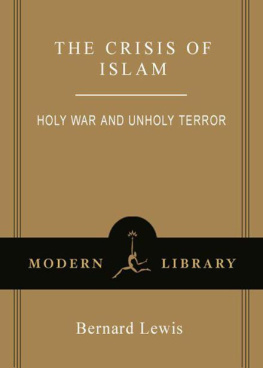Praise for Bernard Lewis
Bernard Lewis, the master of the Middle East universe!
Les Gelb, former president, Council on Foreign Relations
It is clear the author is one of two things: either a candid friend or an honorable enemy. And, in either case, he is one who disdains to distort the truth.
Preface to the Arabic translation of Lewis The Middle East and the West, published by the Muslim Brothers
For newcomers to the subject...Bernard Lewis is the man.
TIME Magazine
The doyen of Middle Eastern studies.
The New York Times
No one writes about Muslim history with greater authority, or intelligence, or literary charm.
British historian Hugh Trevor-Roper
Bernard Lewis has no living rival in his field.
Al Ahram, Cairo (the most influential Arab world newspaper)
When it comes to Islamic studies, Bernard Lewis is the father of us all. With brilliance, integrity, and extraordinary mastery of languages and sources, he has led the way for...investigators seeking to understand the Muslim world.
National Review
Bernard Lewis combines profound depth of scholarship with encyclopedic knowledge of the Middle East and, above all, readability.
Daily Telegraph(London)
Lewis speaks with authority in prose marked by lucidity, elegance, wit and force.
Newsday(New York)
Lewis style is lucid, his approach, objective.
Philadelphia Inquirer
Lewis writes with unsurpassed erudition and grace.
Washington Times
Islam
The Religion and the People
Bernard Lewis
Buntzie Ellis Churchill
2009 by Pearson Education, Inc.
Publishing as Prentice Hall
Upper Saddle River, New Jersey 07458
Prentice Hall offers excellent discounts on this book when ordered in quantity for bulk purchases or special sales. For more information, please contact U.S. Corporate and Government Sales, 1-800-382-3419, .
Company and product names mentioned herein are the trademarks or registered trademarks of their respective owners.
All rights reserved. No part of this book may be reproduced, in any form or by any means, without permission in writing from the publisher.
Printed in the United States of America
Second Printing September 2008 with corrections on October 2011
ISBN-10 0-13-223085-2
ISBN-13 978-0-13-223085-8
Vice President, Publisher
Tim Moore
Associate Publisher and Director of Marketing
Amy Neidlinger
Editor
Yoram (Jerry) Wind
Operations Manager
Gina Kanouse
Digital Marketing Manager
Julie Phifer
Publicity Manager
Laura Czaja
Assistant Marketing Manager
Megan Colvin
Front Cover Design
MVB Design
Managing Editor
Kristy Hart
Senior Project Editor
Lori Lyons
Copy Editor
Anne Goebel
Indexer
Erika Millen
Proofreader
San Dee Phillips
Design Manager
Sandra Schroeder
Interior Designer
Kim Scott, Bumpy Design
Compositor
Jake McFarland
Manufacturing Buyer
Dan Uhrig
Pearson Education LTD.
Pearson Education Australia PTY, Limited.
Pearson Education Singapore, Pte. Ltd.
Pearson Education North Asia, Ltd.
Pearson Education Canada, Ltd.
Pearson Educatin de Mexico, S.A. de C.V.
Pearson EducationJapan
Pearson Education Malaysia, Pte. Ltd.
Library of Congress Cataloging-in Publication Data
Lewis, Bernard, 1916
Islam : the religion and the people / Bernard Lewis, Buntzie
Churchill.
p. cm.
ISBN 0-13-223085-2 (hardcover : alk. paper) 1. Islam--21st
century. 2. Islam--Essence, genius, nature. 3. Religious awak
ening--Islam. I. Churchill, Buntzie, 1939- II. Title.
BP161.3.L482 2008
297--dc22
2008023257
Dedicated to...
Robert and Melanie Dunn
Michael and Jessica Lewis
by Bernard Lewis
Eva Lowell Churchill
Eric Coolidge Churchill and Elka Alice Cloke
by Buntzie Ellis Churchill
Contents
Acknowledgments
It is our pleasant duty to thank a number of people who have helped in the preparation and production of this book:
Tim Moore of Pearson and Jerry Wind of Wharton, without whom there would have been no book; Lori Lyons, who helped greatly in its production, along with Anne Goebel, Jake McFarland, and San Dee Phillips.
Zainab Al-Suwaij of the American Islamic Congress, for her help and advice.
And, as always, Annamarie Cerminaro and Marci Laidler, for their patient nursing of the manuscript.
About the Authors
Bernard Lewis is Cleveland E. Dodge Professor of Near Eastern Studies, Emeritus, at Princeton University. He is the author of the bestsellers What Went Wrong: Western Impact and Middle Eastern Response and The Crisis of Islam: Holy War and Unholy Terror. He has performed the invaluable service of placing current events in the context of history. Lewis has advised policymakers in the U.S., U.K., and the Middle East on the complex relationship between Islam and the West.
A number of his articles have been extraordinarily prescient. The Return of Islam was published 3 years before the Iranian revolution, and the award-winning The Roots of Muslim Rage anticipated 9/11 by a decade. His two dozen books have been translated into more than two dozen languages, including Arabic, Persian, Turkish, and Indonesian.
His contribution to the understanding of history has been recognized by the 15 universities that have awarded him honorary doctorates.
Buntzie Ellis Churchill served for 23 years as the President of the World Affairs Council of Philadelphia, hosting dozens of world leaders from Mikhail Gorbachev and Margaret Thatcher to Henry Kissinger and Colin Powell. A member of the Council on Foreign Relations, she has served as a trustee of many non-profit organizations, including the Pennsylvania Institute of Technology and Drexel University. She has been awarded several honorary doctorates.
For a decade she hosted WorldViews, a daily radio show, interviewing experts on international issues.
Preface
More than three hundred years ago, in 1689, the great English philosopher John Locke published A Letter Concerning Toleration, in which he argued that neither Pagan, nor Mahometan, nor Jew, ought to be excluded from the civil rights of the commonwealth because of religion. In this, he gave a classical formulation of an idea which helped to inspire both the French and American revolutions, and has become an essential guiding principle of the free world. This idea, sometimes called secularism, means that religion is a private and personal matter, outside the realm of government; that membership of the political community, and the rights that go with it, belong to all citizens, of any religion or of none.
Religion remains, however, an immensely powerful factor in human affairs, with profound influence on almost every aspect of public and private, social and economic, cultural and even artistic life. No study of society, whether directed by historians at the past, by social scientists at the present, or by either at the future, can afford to disregard the religious factor. To neglect or even to underrate that factor can lead to serious misunderstandings and open the way to dangerous consequences. A French statesman once said that war is too important to be left to the generals. One might also argue that religion is too important to leave to the theologians.

